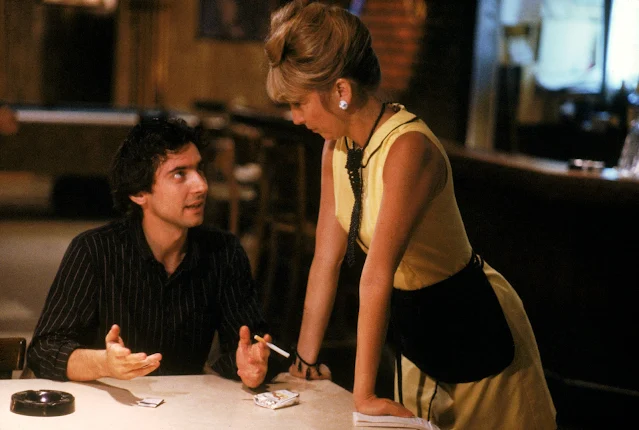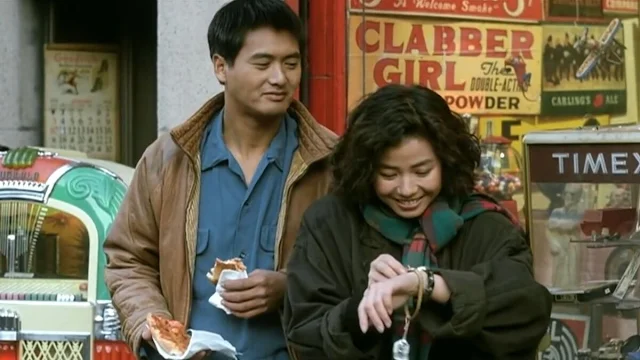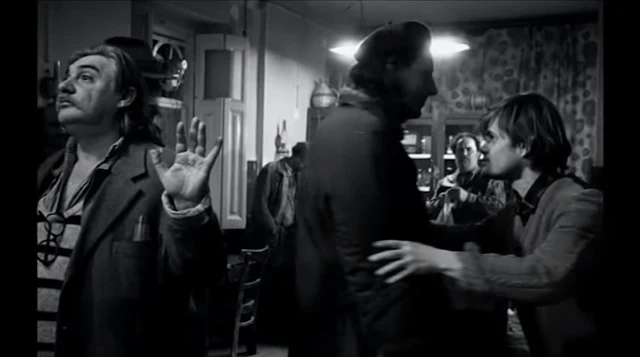 |
| Paul Walker, Alex Neuberger, Cameron Bright, and Vera Farmiga in Running Scared |
A blog formerly known as Bookishness / By Charles Matthews
"Dazzled by so many and such marvelous inventions, the people of Macondo ... became indignant over the living images that the prosperous merchant Bruno Crespi projected in the theater with the lion-head ticket windows, for a character who had died and was buried in one film and for whose misfortune tears had been shed would reappear alive and transformed into an Arab in the next one. The audience, who had paid two cents apiece to share the difficulties of the actors, would not tolerate that outlandish fraud and they broke up the seats. The mayor, at the urging of Bruno Crespi, explained in a proclamation that the cinema was a machine of illusions that did not merit the emotional outbursts of the audience. With that discouraging explanation many ... decided not to return to the movies, considering that they already had too many troubles of their own to weep over the acted-out misfortunes of imaginary beings."--Gabriel García Márquez, One Hundred Years of Solitude
Search This Blog
Wednesday, May 1, 2024
Running Scared (Wayne Kramer, 2006)
Tuesday, April 30, 2024
Werckmeister Harmonies (Béla Tarr, Ágnes Hranitzky, 2000)

One Way Street (Hugo Fregonese, 1950)
 |
| James Mason, Dan Duryea, and William Conrad in One Way Street |
Saturday, April 27, 2024
Full Moon in New York (Stanley Kwan, 1989)
 |
| Gaowa Siqin and Sylvia Chang in Full Moon in New York |
Cast: Sylvia Chang, Maggie Cheung, Gaowa Siqin. Screenplay: Chiu Kang-Chen, Zhong Acheng. Cinematography: Bill Wong. Production design: Lei Pan. Film editing: Chow Cheung-Kan. Music: Chang Hung-Yi.
Full Moon in New York is based on a concept: Show something about the Chinese diaspora through the lives of three young women in New York. And as far as the concept goes, it works. Stanley Kwan gives us three points of origin and three distinct societal roles: Lee Fung Jiao (Maggie Cheung) is a type-A businesswoman from Hong Kong who is having an affair with another woman; Wang Hsiung-Ping (Sylvia Chang) is an unmarried aspiring actress from Taiwan; and Zhaohong (Gaowa Siqin) is a newlywed homemaker from the Mainland. Despite their disparate backgrounds, they meet and become friends largely because they're all Chinese trying to make their way in an alien land and culture. The film is full of lively scenes in which each meets her own particular challenge and finds a way through it, and equally lively scenes in which their friendship blossoms over the way they met these challenges. The three actresses are marvelous, but the supporting cast isn't always up to their standard. I speak no Chinese, so I can't judge the delivery of the Chinese actors, but I found the Americans in the cast sometimes inept and amateurish. There's also something off in the scene in which Wang auditions in English for the role of Lady Macbeth: She seems to be speaking a paraphrase of the sleepwalking scene instead of the actual lines from Shakespeare's play. The scene is really a setup for her to give the American casting director, who wants to know why she thinks a Chinese actress could play the role, a lesson in Chinese history. Still, Full Moon in New York is good enough to leave me wanting more of the stories of these women. It feels very much like the pilot for a TV series that never got made.
Friday, April 26, 2024
Your Name. (Makoto Shinkai, 2016)
Makoto Shinkai's most commercially successful and most critically acclaimed anime is an engaging variation on the body-switch trope usually used for comedy or satire. Here it's the basis for a romantic fantasy about growing up, with its attendant problems of love and loss. A boy in Tokyo wakes up one morning to find that he's inhabiting the body of a girl in a village, and she wakes up with his consciousness inside her body. The usual comic mishaps occur as each goes through the other's daily routine. They wake up the next day with no memory of the switch, but the reactions of their family and friends make them realize that something strange happened. When it happens again and again, they begin to figure out what's going on and to keep a record of it. Eventually each discovers the other's identity and tries to communicate with them, but then the switches suddenly stop. It falls to the boy to recognize that the cessation of the switches has something to do with a disaster that struck the girl's village three years earlier. His determination to get to the source of the mystery forms the main plot of the film. Your Name is overloaded with perhaps more cosmic and mystical stuff than some viewers can tolerate, and it sidesteps some real issues about gender identity, but the astonishing visuals, cliff-hanging action and suspense, and heartfelt emotion help keep the film from bogging down into sheer hooey.
Thursday, April 25, 2024
The File on Thelma Jordon (Robert Siodmak, 1950)
 |
| Wendell Corey and Barbara Stanwyck in The File on Thelma Jordon |
Cast: Barbara Stanwyck, Wendell Corey, Paul Kelly, Joan Tetzel, Stanley Willis, Richard Rober, Minor Watson, Barry Kelley, Gertrude Hoffman. Screenplay: Ketti Frings, Marty Holland. Cinematography: George Barnes. Art direction: Hans Dreier, A. Earl Hedrick. Film editing: Warren Low. Music: Victor Young.
The chief problem with The File on Thelma Jordon is casting. Barbara Stanwyck's performance is terrific, of course, Robert Siodmak keeps a complex plot from snarling, and George Barnes's lights and shadows are eloquent. But Stanwyck is paired once again with Wendell Corey, who was her ineffective leading man in Anthony Mann's otherwise splendid The Furies, also made in 1950. Corey has no charisma and no depth. The screenplay may be at fault in not letting us see why Cleve Marshall's antagonism to his father-in-law is driving him to drink -- and into the arms of Stanwyck's scheming Thelma Jordon -- but Corey's hangdog manner doesn't help. Nor does he bring much visible intelligence to Marshall's scheming to undermine his own defense of Thelma when she's brought to trial for killing her aunt -- a murder he helped her cover up. The ending is also a bit of a muddle, largely because the Production Code meant that Thelma's crime had to be punished. What could have been a classic film noir ends up only a passable one.
Wednesday, April 24, 2024
After Hours (Martin Scorsese, 1985)
 |
| Griffin Dunne and Teri Garr in After Hours |
Cast: Griffin Dunne, Rosanna Arquette, Verna Bloom, Tommy Chong, Linda Fiorentino, Teri Garr, John Heard, Cheech Marin, Catherine O'Hara, Dick Miller, Will Patton, Robert Plunket, Bronson Pinchot. Screenplay: Joseph Minion. Cinematography: Michael Ballhaus. Production design: Jeffrey Townsend. Film editing: Thelma Schoonmaker. Music: Howard Shore.
Martin Scorsese's dark farce After Hours puts protagonist Paul Hackett (Griffin Dunne) through all the wringers that 1980s New York City could provide. It's often described as "Kafkaesque" with reason: Scorsese borrowed from a Kafka story in the scene in which Paul tries to persuade a doorman to let him into a night club. But it also reflects the director's feelings about being given the runaround by the bureaucracy of the movie business as he tried to get The Last Temptation of Christ (1988) under way. There are those who think After Hours has a misogynistic edge, given that most of Paul's troubles stem from his interactions with women, starting with Marcy (Rosanna Arquette), who flirts with him and sets the whole fantastic plot in motion. But Paul's frantic inability to seize control of events -- some of which, like the loss of his money, are pure accident -- is also to blame. He's an Odysseus blown off course by fate, with the occasional Circe or siren to make things worse.
Tuesday, April 23, 2024
An Autumn's Tale (Mabel Cheung, 1987)
 |
| Chow Yun-fat and Cherie Chung in An Autumn's Tale |
Cast: Chow Yun-fat, Cherie Chung, Danny Chan, Arthur Fulbright, Gigi Wong, Joyce Houseknecht. Screenplay: Alex Law, Low Chi-Yeuh. Cinematography: David Chung, James Hayman. Production design: Christy Addis. Film editing: Chu Sun-Kit. Music: Lowell Lo.
The chemistry between Chow Yun-fat and Cherie Chung animates the somewhat rough-edged romance of Samuel Pang (Chow) , a thirtysomething slacker, and Jennifer Lee (Chung), a twentysomething woman who arrives in New York expecting to meet her boyfriend, Vincent (Danny Chan), only to find he has a new girlfriend and is moving to Boston. Samuel, known as Figgy (short for Figurehead, a reference to his years as a sailor), takes her under his wing, though she's put off by his slacker ways -- he survives mainly by gambling and carousing with his pals. As in any good romance, she loosens up and he straightens up, though not without the usual backsliding. The film gives some fresh twists to the usual romcom tropes.
Monday, April 22, 2024
Children Who Chase Lost Voices (Makoto Shinkai, 2011)

Cast: Voices of Hisako Kanemoto, Miyu Irino, Kazuhiko Inoue, Junko Takeuchi, Fumiko Orikasa, Sumi Shimamoto. Screenplay: Makoto Shinkai. Cinematography: Makoto Shinkai. Art direction: Takumi Tanji. Film editing: Aya Hida, Makoto Shinkai. Music: Tenmon.
Myth-making anime fantasy, crafted with Makoto Shinkai's usual opulence, Children Who Chase Lost Voices draws on a variety of legends about the underworld, including Orpheus's journey to Hades to reclaim Eurydice. The protagonist is a young girl, Asuna, who finds herself in a subterranean land called Agartha, accompanied by her teacher, Mr. Morisaki, who knows a good deal, though not enough, about Agartha. He wants to go there to see if he can bring his dead wife back to life. Asuna is driven by curiosity about a strange boy named Shun, whom she met on her wanderings in the hills near her village. They discover that they have to deal with the animosity of the residents of Agartha toward people from the upper world. (The subtitles call them "Topsiders," which for me has a distracting footwear overtone.) It's too creepy and violent for younger kids, and some of its plot points, such as the suggestion that Agartha has been exploited by malign upper-world forces like the Nazis, need better context. But it's never boring and always a treat for the eye.
Sunday, April 21, 2024
Deal of the Century (William Friedkin, 1983)
 |
| Chevy Chase in Deal of the Century |
Cast: Chevy Chase, Sigourney Weaver, Gregory Hines, Vince Edwards, Wallace Shawn, Richard Libertini, William Marquez, Eduardo Ricard, Richard Herd, Graham Jarvis. Screenplay: Paul Brickman. Cinematography: Richard H. Kline. Production design: Bill Malley. Film editing: Jere Huggins, Ned Humphreys, Bud S. Smith. Music: Arthur B. Rubinstein.
Chevy Chase, Sigourney Weaver, and Gregory Hines stumble through the chaotic screenplay of Deal of the Century, not trying very hard to help it tell a coherent story or even be funny. Ostensibly a satire of the Reagan-era arms race, it was a critical bomb and a box office dud, and unlike many such double failures hasn't even made it to cult-movie status. Too much of it fails to make sense, like the marriage of the characters played by Weaver and Wallace Shawn, the religious conversion of Hines's character, or Chase's character getting repeatedly shot in the foot. Cheesy special effects don't help, either.















